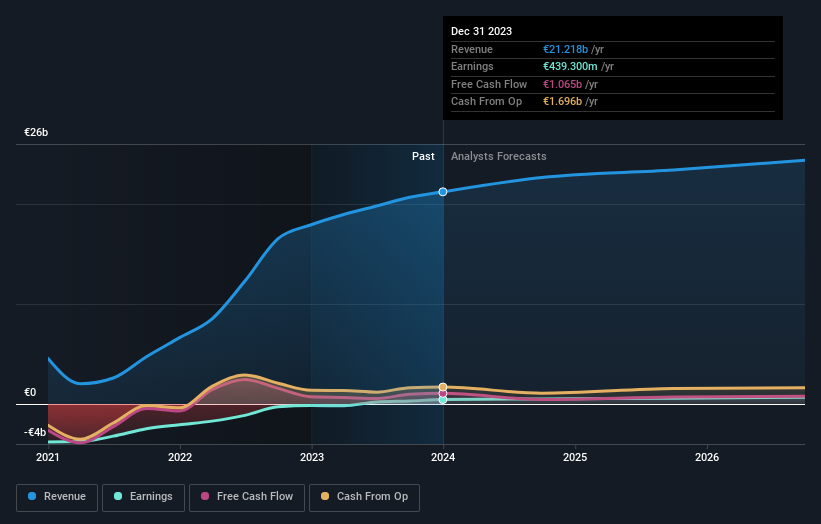Stock Analysis
- Germany
- /
- Hospitality
- /
- XTRA:TUI1
Both individual investors who control a good portion of TUI AG (ETR:TUI1) along with institutions must be dismayed after last week's 5.9% decrease

Key Insights
- The considerable ownership by individual investors in TUI indicates that they collectively have a greater say in management and business strategy
- 44% of the business is held by the top 25 shareholders
- Insiders own 11% of TUI
A look at the shareholders of TUI AG (ETR:TUI1) can tell us which group is most powerful. The group holding the most number of shares in the company, around 55% to be precise, is individual investors. In other words, the group stands to gain the most (or lose the most) from their investment into the company.
While institutions who own 33% came under pressure after market cap dropped to €3.3b last week,individual investors took the most losses.
In the chart below, we zoom in on the different ownership groups of TUI.
View our latest analysis for TUI

What Does The Institutional Ownership Tell Us About TUI?
Institutions typically measure themselves against a benchmark when reporting to their own investors, so they often become more enthusiastic about a stock once it's included in a major index. We would expect most companies to have some institutions on the register, especially if they are growing.
As you can see, institutional investors have a fair amount of stake in TUI. This implies the analysts working for those institutions have looked at the stock and they like it. But just like anyone else, they could be wrong. When multiple institutions own a stock, there's always a risk that they are in a 'crowded trade'. When such a trade goes wrong, multiple parties may compete to sell stock fast. This risk is higher in a company without a history of growth. You can see TUI's historic earnings and revenue below, but keep in mind there's always more to the story.

Hedge funds don't have many shares in TUI. The company's largest shareholder is Alexey Mordashov, with ownership of 11%. BlackRock, Inc. is the second largest shareholder owning 5.0% of common stock, and The Vanguard Group, Inc. holds about 4.2% of the company stock.
A deeper look at our ownership data shows that the top 25 shareholders collectively hold less than half of the register, suggesting a large group of small holders where no single shareholder has a majority.
While studying institutional ownership for a company can add value to your research, it is also a good practice to research analyst recommendations to get a deeper understand of a stock's expected performance. There are a reasonable number of analysts covering the stock, so it might be useful to find out their aggregate view on the future.
Insider Ownership Of TUI
While the precise definition of an insider can be subjective, almost everyone considers board members to be insiders. Company management run the business, but the CEO will answer to the board, even if he or she is a member of it.
I generally consider insider ownership to be a good thing. However, on some occasions it makes it more difficult for other shareholders to hold the board accountable for decisions.
Our most recent data indicates that insiders own a reasonable proportion of TUI AG. It is very interesting to see that insiders have a meaningful €361m stake in this €3.3b business. Most would say this shows a good degree of alignment with shareholders, especially in a company of this size. You can click here to see if those insiders have been buying or selling.
General Public Ownership
The general public, mostly comprising of individual investors, collectively holds 55% of TUI shares. This level of ownership gives investors from the wider public some power to sway key policy decisions such as board composition, executive compensation, and the dividend payout ratio.
Next Steps:
I find it very interesting to look at who exactly owns a company. But to truly gain insight, we need to consider other information, too. To that end, you should be aware of the 2 warning signs we've spotted with TUI .
Ultimately the future is most important. You can access this free report on analyst forecasts for the company.
NB: Figures in this article are calculated using data from the last twelve months, which refer to the 12-month period ending on the last date of the month the financial statement is dated. This may not be consistent with full year annual report figures.
Valuation is complex, but we're helping make it simple.
Find out whether TUI is potentially over or undervalued by checking out our comprehensive analysis, which includes fair value estimates, risks and warnings, dividends, insider transactions and financial health.
View the Free AnalysisHave feedback on this article? Concerned about the content? Get in touch with us directly. Alternatively, email editorial-team (at) simplywallst.com.
This article by Simply Wall St is general in nature. We provide commentary based on historical data and analyst forecasts only using an unbiased methodology and our articles are not intended to be financial advice. It does not constitute a recommendation to buy or sell any stock, and does not take account of your objectives, or your financial situation. We aim to bring you long-term focused analysis driven by fundamental data. Note that our analysis may not factor in the latest price-sensitive company announcements or qualitative material. Simply Wall St has no position in any stocks mentioned.
About XTRA:TUI1
TUI
TUI AG, together with its subsidiaries, provides tourism services worldwide.
Undervalued with acceptable track record.

